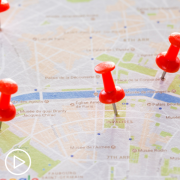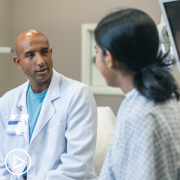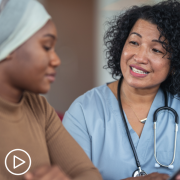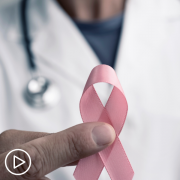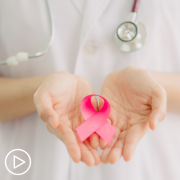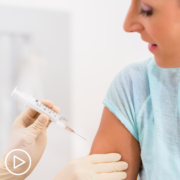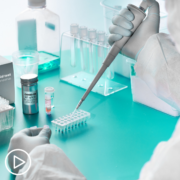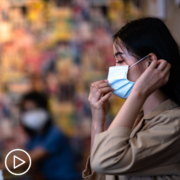How Can I Get the Best Lung Cancer Care No Matter Where I Live? from Patient Empowerment Network on Vimeo.
How can those living with lung cancer ensure they get quality care even if they live in rural areas? How can lung cancer patients gain confidence in voicing treatment concerns and in communicating with their healthcare team? Watch as Dr. Olugbenga Okusanya shares key points about such vital topics for the lung cancer community.
See More from Best Lung Cancer Care No Matter Where You Live
Related Resource:
Transcript:
Dr. Nicole Rochester:
Hello and welcome. I’m Dr. Nicole Rochester, your host for today’s Patient Empowerment Network program. Today we’re going to be talking about how long cancer patients can truly get the best care no matter where you and your family live. We’re going to talk about things like how can I remove roadblocks in my care to gain access to state-of-the-art treatment? Will my insurance limit me if I want to get a second opinion? As a care partner, how do I best advocate for my partner, and is a clinical trial right for me? The answers to some of these questions we’ve received revolve around awareness, feeling empowered to ask questions, and connecting to the right resources at the right time. In this program we’ll be learning just that as we meet our guest expert. It is my honor and privilege to be joined by Dr. Olugbenga Okusanya, he is an assistant professor of Thoracic Surgery at Thomas Jefferson University Hospital. Thank you so much for joining us, Dr. Okusanya.
Dr. Olugbenga Okusanya:
Absolutely. It’s a pleasure to be here, thank you for having me.
Dr. Nicole Rochester:
Now we’re gonna start with talking about some of the barriers to lung cancer care. We know that there are many factors that can negatively impact outcomes for patients and families facing a lung cancer diagnosis, including things like social stigma for smoking, geographic location, socioeconomic status, insurance and access to care, financial hardships, and access to transportation. So, my first question to you, Dr. Okusanya is, what are some of the barriers that both lung cancer patients and their care partners face when they are seeking care?
Dr. Olugbenga Okusanya:
First of all, thank you very much for putting a spotlight on lung cancer care, we really need more people to help us treat this really terrible disease.
There are a number of barriers for our patients in order to get the best care possible. Number one, we actually find at diagnosis, we find that a lot of patients have lung nodules that have been seen because maybe they got a chest x-ray or a CAT scan for some other reason, and maybe they don’t get followed up on because they don’t have a steady source of healthcare, they don’t have a PCP or someone who regularly follows up on their health information. We have trouble also sometimes getting patients in the appropriate diagnostic studies that they need, oftentimes, we find patients that may show up in the hospital that have a significant problem and they may need a special kind of CAT scan or a biopsy, and they simply do not have the resources to get to said CAT scan or get to said biopsy, which is critical in making the appropriate diagnosis so we can get them to the right therapy. One of the biggest things that you mentioned is finding a specialist in terms of all aspects of lung cancer care, whether it is surgery, medical oncology, or radiation oncology, there are medical practitioners that mostly specialize in lung cancer care, and because of that, they’re gonna have access to different resources, they’re gonna think differently about the disease process and they’re gonna approach each patient differently because of the disease process So finding someone who really thinks and works in the lung cancer space all the time, I think it’s a barrier to patients getting really good care.
We also find that one, cancer care has a lot of hurdles, apart from proper CAT scans, biopsies, work-ups, actual interventions, there are a lot of steps that patients have to go, to get from even just getting a diagnosis to getting treatment and having patients move through that period of time, which is we hope usually four to six weeks in a sort of step-by-step manner can be extremely eliminating. So we really are trying to condense those things so patients can meet all the specialists, they need to get all the tests that they need to get in maybe one or two concise visits and then get into care, and lastly, as you mentioned, not having access to what we call multidisciplinary conferences is a limitation because there are more and more nuanced ways that lung cancer is presenting and being treated, that needs to be discussed between a surgeon and radiation oncologists and the medical oncologists, preferably all in the same setting, all at the same time. So having access to those clinics where we can have a really high-level discussion about the best thing to do for a patient, I feel is a significant barrier, especially for our patients with advanced disease.
Dr. Nicole Rochester:
Thank you so much. Wow, you have given us so much to think about and I appreciate your thorough answer. One of the things that I’m struck with as you talk about all of these steps and the fact that ideally, they need to be undergone within a certain time period, of course, it’s time-sensitive. And you mentioned navigating, and certainly, that’s something that I deal with on a regular basis, just the challenges of navigating through each one of those steps can be extremely difficult, you’ve gone through a lot of the barriers that patients and their family caregivers may face. Let’s talk about some of the solutions. Are there a few solutions that you can suggest for overcoming some of these barriers that you just described?
Dr. Olugbenga Okusanya:
Yeah, I think from the patient’s perspective, there are a number of things you can do to really help yourself. Number one is a good healthy dose of research, that means getting online, Googling, finding lung cancer experts, preferably in your region, finding out what their interests are, what are the things that they typically research and take care of, and then finding a way to get in contact with them. I think that is really step number one, it’s finding someone who specializes in the disease, and then to find someone that you actually get along, someone who you have a relationship with, a truly therapeutic relationship and invest in that person, and if they’re the right person for you, whether it be personality fit, whether it be background, you will find a relationship with them that will actually help you get through that process. I would also say many programs actually have nurse navigators who are people that help you navigate this process, that is quite literally why they are part of the health system, so if you can find programs and have nurse navigators, they can really be instrumental in setting up appointments that are either overlapped right after one another, all in the same place, things that really help smooth the edges of getting all the work I’ve done at on time.
And again, I would also recommend the patients, I would try to stack your appointments or stack your visits so that they are not quite so spread out over space and time, because a visit, usually it takes a few days to get a result, which then takes a few days to get a course of action, which then can sometimes provoke another test.
So, the more times than things are stacked together and information just a get to get in big packets, I think really the better for moving through the process.
Dr. Nicole Rochester:
I appreciate that. I think what I’m hearing in your answers is really the importance of patients putting themselves in the driver’s seat, which is another thing that I strongly advocate for. I think many patients and family members don’t see that as their role, and they don’t understand and appreciate the value of doing these things that you just talked about, doing your own research and finding providers with whom you connect it’s so incredibly important, especially when it comes to cancer and other serious diseases. So, I want to switch gears a little bit and talk about racial and health disparities, ethnic and health disparities, specifically in lung cancer care. I know that you have done some research in this area, and certainly being a person of color, this is something that I would imagine you relate to, so we know that the CDC and many other healthcare organizations have now declared racism a public health crisis, and certainly in 2021, we continue to see worse outcomes for cancer and many other chronic illnesses in people of color, so I’m curious, what do you think are the notable health disparities that are consistently seen in treating BIPOC patients living with lung cancer?
Dr. Olugbenga Okusanya:
Yeah, unfortunately, this is an area of interest of mine. And it turns out that the disparities are literally every single stage. There’s not an aspect of lung cancer care, which there is not a significant disparity that hinders the ability of minority patients to get better care, period at all stages. So overall survival for lung cancer for black patient is worse than white patients, even though black patients get diagnosed on average two to three years younger than their white counterparts. Black patients are less likely to get surgical therapy for early-stage disease, which is the actual care for an early-stage disease dates than black patients, than white patients, that gap has been narrowing over the last 20 years, but it is by no means closed. Black patients are unfortunately less likely to get an appropriate work-up to get the indicated tests. They are also less likely to get the chemotherapy when it is indicated, and they are less likely to be enrolled in clinical trials. So, literally at every step there is a significant inequity that affects black patients, and I think it’s really disheartening to see in a field where lung cancer is the most common killer and cancer, and frankly, there are lots and lots of patients who have options, who have good options that never get investigated and never get delivered.
Dr. Nicole Rochester:
That is extremely heartbreaking, and it’s sad to hear that we see the same disparities in lung cancer that we see with every other chronic condition, with every other cancer, certainly what we’ve seen recently with COVID-19 as well, and it really underscores what you said previously, which is the importance of being an advocate for yourself and doing your research and making sure that you really are getting the best care, which could be difficult when you’re struggling with your cancer diagnosis. Sometimes I get angry, I feel like we’re putting so much responsibility and so much burden on the patient. With that said, what are some things that patients of color can do in order to protect themselves from these inequities that you’ve talked about, starting with diagnosis and treatment, what can we do? What can patients of color do?
Dr. Olugbenga Okusanya:
So, I think the number one thing is to ask questions, the number one thing is to say, what are my options? What am I dealing with? What should I do or what shouldn’t I do? And to really make sure you get the most at that time when you see a physician, because that is really what we’re there for apart from the surgery, I’m really there to be an educator. I teach as much as I operate on a daily basis whether it be the medical training is whether in my patients, my job is to communicate information back and forth, so you really want to spend the time asking questions and getting as much information out, as much as you can. Number two is, see a specialist. There’s also very good data to indicate that as a black patient, if you see a board-certified thoracic surgeon, you are more likely to get lung cancer surgery than if you were to see a surgeon of unknown specialization, a general surgeon. So clearly the training gives specialist the ability to make finer determinations and discernments that I think in large part favor black and minority patients, so you wanna find someone who deals with these disease processes all the time because they’re gonna look at it in a much higher level and look at it with a lot more granularity.
Dr. Nicole Rochester:
Just have to repeat what you said, you said, I teach as much as I operate. That just really resonated with me, and I think that… That’s so incredibly important. Doctor means teacher, right? I think that’s the Latin… We are obligated to teach our patients, so I just really appreciate that that’s something that you incorporate in your daily practice. If we shift gears a little bit and talk about access and some of the concerns about treatment access for lung cancer patients, which you’ve actually alluded to, we know that sometimes these barriers that patients face actually limit their access to treatments, and you indicated surgery as being the mainstay and some difficulties with that, so how can we empower patients so that they don’t feel limited in their care, and how do we make them aware of these treatment options that are available, so that if they are in an office and maybe something’s being offered, but that’s not actually, the standard of care, how do we empower them to get that information and then to act on it?
Dr. Olugbenga Okusanya:
Yeah, so number one, which is something I think people do and they don’t realize how valuable it is, bring a friend to the appointment, don’t come by yourself, because you are in an incredibly vulnerable position, you’ve learned or are learning something incredibly emotionally charged and usually very scary. So, you want to bring someone who obviously is gonna love you and care about you, but has enough emotional distance from it that they can be your advocate, they can ask those questions in the room that you may just not be there mentally to ask. Number two, never be afraid to get a second opinion, if you’re lucky enough to live in a populous area with multiple health systems, get a copy of your chart, get a copy of your data, get your disc, make an appointment to see another specialist in another health system and see what they say. Because at the very least, if the information is concordant, then you’re gonna feel pretty good about saying, okay, then I should just go where I think I feel best or who I have the best sort of relationship with. And again, if you are not lucky enough to have that opportunity, I would be very aggressive about seeing if telehealth is an option to reach out to someone who is a specialist, I’ve had not happened to me in the past, I remember I had a woman who telehealth, me from Ohio, because she’d actually read one of my papers about lung cancer, and she sent her scans, uploaded them, I looked at them and I gave her my opinion, and this is the new age or medicine.
This is where we’re at now. This is a viable option, and even if telehealth isn’t an option, you can always just get on the phone. As a lung cancer specialist, a lot of the information I need can be garnered from test scans and images, so frankly, the physical exam has some role, but is not the mainstay of how a lot of the decisions are made. So even if I see your scans and I talk to you, I can give you an opinion over the phone, it takes me 15-20 minutes, and a lot of times, those visits may not even be charged, depending on who you actually ask to give you an opinion.
Dr. Nicole Rochester:
Wow. Free of charge. Okay, I see you’re teaching me something that I didn’t know. I’m a huge proponent of second opinions, I’ve talked to so many patients and family caregivers who think that they’re offending their doctor if they ask for a second opinion, so I appreciate that you brought that to the forefront and you deserve to have multiple opinions as you’re making these very important life-changing decisions. So, thank you for sharing that. This is a perfect segue. You mentioned telehealth, and we know that one of the barriers to receiving care, and you’ve indicated that in terms of having access to a multi-disciplinary team, having access to thoracic surgeons as opposed to general surgeons, so we know that that is impacted by where we live, and that often our geographic location can actually be a barrier to the receipt of quality care, so I’d love for you to just talk a little bit about how patients who may be in more remote locations can make sure that they are also receiving appropriate care for their lung cancer.
Dr. Olugbenga Okusanya:
Yeah, I think this is a very substantive challenge, I think this is one of the holes in healthcare, there’s these regions in the country where you just are not gonna have access to any number of surgical sub-specialist or radiation oncologist, or lung cancer specific oncologists. I think that is a really big challenge. I think we have actually learned through the pandemic that these physical barriers really are not the reason to not get the best care, so I think those patients should be exquisitely interested in telehealth and in phone calls, and I think most healthcare systems now, because the reimbursements have been approved for telehealth and actually now built infrastructure to support it as an ongoing concept. So now, if you are a patient that’s in Arizona and you want to talk to a doctor who’s in New Jersey, you can do that, you can make that happen. If you find someone, you Google them, you find a friend in that area who know someone, you can call their office and say, I want to have a telehealth visit, and as long as you have broadband internet and a phone, you can do it. You can have that conversation.
So, I would advocate for people to really make sure that you at least feel like people in the sort of local regional area that you can perhaps get to maybe two, three hours away, but you can imagine a scenario where you can get there, you can try and establish some level of care and some level of rapport with them. I think that’s something that has really opened, has been one of the few good things to come out of the pandemic.
Dr. Nicole Rochester:
I was gonna say the exact same thing. That is one… There haven’t been a lot of positive things, but that certainly is one of the positive outcomes of the pandemic, is this surge, and it’s not that we already had the capability, but it certainly was not being used to its maximum capacity. I appreciate that. So, speaking of telemedicine and COVID, think one of the challenges that patients and often care partners have is understanding when is a telemedicine or telehealth visit appropriate versus when do you actually need to go see that doctor in person, so… Can you help clarify that?
Dr. Olugbenga Okusanya:
Yeah, so I think in general, even if you start with the telehealth is, I think there’s very little downside to telehealth for almost anyone in general, because a lot of the information can be garnered from the patient record, from their scans. I think in general; it gives you 85% of what you need out of that interaction, and it may be more convenient for the patient, a lot of times it’s actually more convenient for the doctors, doctors have now found ways to work from home. They do have to have their clinic from home, it’s a much more relaxed environment than more efficient. I think there are times like for instance, I have to make decisions about offering surgery to patients who I consider to be moderate or high risk, I think there is a benefit and having that patient come and see me in the office because they have to somehow pass what we call the eyeball test, and that is a little bit of where this disparity comes in in lung cancer surgery, because it depends on who’s eyeball is looking at you, making your determination about what they think is gonna happen with you in surgery.
I remember… Actually, one of my favorite patients ever. She had data that did not look like she would tolerate surgery, everything about her data did not look favorable. And I saw her, I remember seeing her in person, and you could see the spark in her eye and energy that she had, and I said, you know what, we’re gonna do it. And she did great, she did phenomenally well. And that is a case where if you’re in the population of patients that may be slightly more moderate, slightly more high risk, and you need someone to really look you in the eye and you say, I’m going to do what it takes to get through this. I think that’s the patient where the in-touch, in-person visit really is that extra touch that can be benefited.
Dr. Nicole Rochester:
Wow, I love what you said about the spark in her eye and also how you connected that to health disparities, and I don’t know the race or ethnicity of the patient that you’re describing, but we certainly know that that makes a difference, and I just wonder if that had been a different physician, would they have seen that same spark? And I think it just goes back to what we were talking about earlier, and the importance of finding a physician or health care provider with whom you connect, someone that actually respects you, someone that listens to you and see you as a whole person. So, the fact that you were willing to go beyond that data on her chart, which screamed, this is a poor surgical candidate, met her in person, and something about her let you know that she was gonna be okay.
Dr. Olugbenga Okusanya:
Agree. And that’s why in medicine and surgery is still art at the end of the day, it’s still an art. You make decisions, best informed decisions, but there’s a lot of it that is still really special and mystical in a way, and I think having that in-person interactions will let you practice that and it’s exactly what you said, you want to have a really nice relationship with the physician, especially anyone that’s gonna be doing anything that might be invasive or dangerous because for the most part, you meet someone for 45 minutes and then you sign up for what could be a life-threatening event. So, you, the physician and the patient should feel really good about that interaction and whatever that energy is, it’s really important, it’s a little bit kind of sacred, I think, and I think it’s really valuable to invest in that if you don’t like the surgeon, you really don’t feel like it’s a good fit or you don’t like your oncologist, find someone else. You’ll do better in the long run, for sure.
Dr. Nicole Rochester:
That is so incredibly important. I agree, 100%. So much of healing is beyond just the nuts and bolts of the medical care that we provide, or in your case, the surgical care, there’s so much more to that, that’s not really well studied, but that relationship and that connection is key.
Dr. Olugbenga Okusanya:
Critical, and that’s not to say that necessarily the person has to be like the warmest, friendlies, the most fun person you ever met, some people prefer a more yes ma’am, no ma’am, clear cut, well-defined boundaries of a relationship. Some people prefer a big hug and a laugh and a joke, so if you’re getting what you need, that’s exactly what you need, and if you’re not getting what you need, you should think about your other options.
Dr. Nicole Rochester:
Love it, love it. Alright, Dr. Okusanya, so we’re gonna talk now about staying on that theme of empowering patients, we know that all of these barriers that we’ve been discussing can impact and limit treatment options, and we know that late diagnoses or not getting the proper care at the outset will lead to more complications and unfortunately, even death in some situations, and as you’ve alluded to, we know that patients who are educated about their illness, patients who take an active role in their medical care receive better care, they have better outcomes. So, what are some key questions that patients and care partners should ask at the very beginning when they are first beginning this journey with lung cancer?
Dr. Olugbenga Okusanya:
So, I would say… Question number one that I would ask is like, do you specialize in this? Is something that you do on the regular basis? What percentage of your practice is lung cancer care? You would really like an answer that’s more than 50%, you would like someone who sees lung cancer patients and take care of lung cancer patients as a matter of routine. And something I would also say as a patient, you kind of want your care to be routine, you don’t wanna be someone where things are just being figured out for the first time, you really wanna have someone who does this all the time. The other questions I would ask are, can you tell me what all the options are, not just the one you’re offering to me, I really wanna know what all the options are, and I always tell patients the options are really very broad. A physician chose the option is one, you may wanna not do anything that is an option, you know saying We know it’s there; we understand and we’re gonna watch it or not do anything is a very reasonable option they should tell you about biopsies or surgery or non-invasive therapeutic modalities.
You really wanna say, I want you to give me the laundry list, all the things that are possible in the institution that I’m sitting in. And then I would also ask, what are the things that you are not considering before that might be options. What are the things that maybe you’ve ruled out in your mind and can you tell me more about that? Because we’re very physician, they’re very good at heuristics, really good at skipping steps and making next logical jobs, so it’s good to ask one of those steps that you skipped in your life and why did you skip them? And then the last thing I would ask is, Is this the kind of case that should be discussed in a multi-disciplinary clinic or conference? Is there anybody else I should talk to about this problem? And I think if you can ask those questions and feel very confident about asking those questions again, most practitioners who are high level and specializing, this will not be offended, they will be glad that you’re asking the question, it will be a relief for both of you. I think if you can ask those questions, you can really help to eliminate some of those ascites and really get on the right trajectory from the beginning.
Dr. Nicole Rochester:
Those are such important questions, starting with the first one you provided, which is… Do you specialize in this? I think that we spend a lot of time sometimes betting, other professionals, even hair stylists, or if we wanna get our car fixed, we wanna go to the person that specializes and whatever is wrong with that particular problem, but we don’t always take such care with our most precious commodity, our body. So, I think that’s so incredibly important that we ask that question, and it’s not to make bad comments about those who don’t, but people like yourself have trained for many years, and there’s something to be said about that when this is your area of focus, and this is what you do day in, day out. So, I love that, I also really love what you said about kind of getting inside of the brain of the doctor, because you’re right, we’re skipping steps and we’re going through algorithms, but we don’t often bring the patient into that process, and so I really love the idea of the patients questioning, are there things that you didn’t consider and why? And really having a full understanding of all of those treatment options, and maybe if the doctor has erroneously ruled out one of those possibilities based on maybe an assumption that gives the patient an opportunity to clarify that.
That is very powerful.
Dr. Olugbenga Okusanya:
And I would say, as a patient, oftentimes, we wanna describe very positive feelings towards your physician, it’s a notch a very natural thing to do because you want them to be good, so that eventually you’ll be good and they’ll take good care of you. You wanna ascribe those positive thoughts, and I think that’s very reasonable, but we should approach that with a little bit of question because this is someone who has a lot of information and a lot of knowledge, and you wanna make sure you are getting everything in the middle, so it doesn’t get lost in translation. You wanna make sure you’re there for that conversation.
Dr. Nicole Rochester:
Absolutely. What advice do you give to patients that you see so that they can feel empowered Dr. Okusanya? Is there any specific advice that you give when you see patients and things that just helped them to take this active role that you’ve been describing?
Dr. Olugbenga Okusanya:
Number one, I tell patients to bring someone with them to their appointments, someone who can stand by as within reason someone who can be there to listen as well, ’cause usually I say, if I tell you 100 things in an appointment which can legitimately have, I could give you 100 unique points of information and in 1 45-minute visit. If you catch 30 of them or 35 of them, you really understand that. I think that’s a lot because they’re very emotionally charged. So, hopefully someone else, it’s with you, maybe catches another 30 or 40, and that gets you to a point where you can really sit down later and understand. I encourage patients to take notes to write things down, and if they want to, to record, to have audio recording of the session, I wouldn’t say anything to you now that I wouldn’t say in a month or in a year, or anywhere else. I’m gonna tell you exactly what I think and I… And if I have uncertainty, I will expose that uncertainty, I will let you know that this is a case that could go either way. And this is a piece of information that I’m looking back and forward between these two options and that really helps the patients later on go back and say, Did I really hear that right? Did I really understand it, right? So that you can feel like you’re getting the best care, and I really think that you have to make sure that you feel comfortable with the provider.
I think that’s just the number one thing. Are you happy with them? Do you like the way they comported themselves? Did you like the way they spoke to you? Did you like their staff? Also remember, you’re likely gonna be interacting with their staff as much as you interact with the physician, so the other people in the office, the front desk people, the nurse practitioners, the medical assistants, those are the people that you’re gonna spend a lot of time talking to. Did you have a good rapport with them? Also, all that stuff counts to make sure that you’re getting the best experience possible and that you can really be an advocate for yourself.
Dr. Nicole Rochester:
That is incredible. Well, it’s just about time for us to wrap up, I just wanna reiterate, you share so many pearls today, but I just wanna reiterate a few of them, and they really resonate with me as a former caregiver and as a health advocate, but that’s the importance of asking questions, the importance of bringing a buddy, and I appreciate that, particularly in your field, when we go into a doctor’s office and the word cancer is stated, everything else goes out of the window, and even in less threatening situations, there’s data that shows that… I think about 20% to 25% of what we say as physicians is actually retained, so certainly when you get a bad diagnosis, that number is even lower, so bringing somebody with you who is not necessarily emotionally detached, but they can literally kind of be the note taker, and they may even pick up on some nuances and things that you may have missed as a patient is so incredibly important. I love that you’ve offered the option of recording, I think that’s also another tool that many patients and family members aren’t aware of, and I think there’s an assumption, and it’s true to some degree that doctors don’t wanna be recorded, but knowing that that is an option.
The fact that the care that we receive really is impacted by whether or not the person specializes in lung cancer, a thoracic surgeon, and being empowered to ask that question, is this your specialty? How often do you see patients like me and being empowered to ask those questions that ultimately won’t lead to improve care is just so incredibly important, and I think just everything that you’ve shared that really allows the patients and the caregivers to understand just how important their role is you’re the one that’s going to take out the cancer and you’re the one that’s going to get them better, but there’s so many things that happen before that step, before they are on that operating room table that is so important. Do you have any closing thoughts that you’d like to share with us, Dr. Okusanya?
Dr. Olugbenga Okusanya:
I think for patients and their advocates, I think it’s really important number that you’re putting together a health care team. You’re putting together a group of people like the avengers. You’re putting together a bunch of people to come together to help you deal with this health problem. You are entering into a therapeutic relationship, so that relationship has to be healthy in order for you to have the best possible outcome, you should feel good about, you know, your doctor is gonna be very skilled, became very knowledgeable, and just like we talked about before. You really wanna find someone who has the heart of a teacher, someone who can sit down and explain it to you in a way that’s gonna be digestible and that is gonna be actionable. So I think if patients and advocates remember that you wanna build a really solid, a really healthy relationship with someone who’s gonna help you take care your health, I think if you do that, you’re going to be in excellent care.
Dr. Nicole Rochester:
Awesome. Well, I really enjoyed this time. Thank you so much, Dr. Okusanya, you have given us so much useful information, and I wanna thank all of you again for tuning into the Patient Empowerment Network program.
